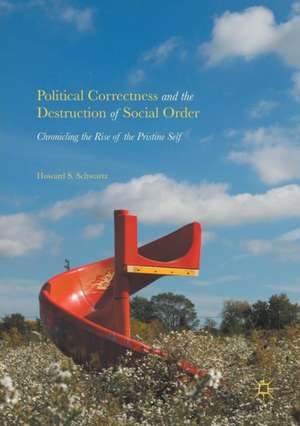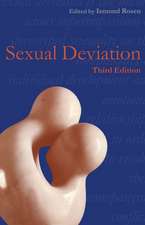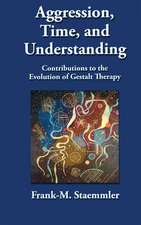Political Correctness and the Destruction of Social Order: Chronicling the Rise of the Pristine Self
Autor Howard S. Schwartzen Limba Engleză Paperback – 9 apr 2018
| Toate formatele și edițiile | Preț | Express |
|---|---|---|
| Paperback (1) | 197.26 lei 6-8 săpt. | |
| Springer International Publishing – 9 apr 2018 | 197.26 lei 6-8 săpt. | |
| Hardback (1) | 386.61 lei 6-8 săpt. | |
| Springer International Publishing – 20 sep 2016 | 386.61 lei 6-8 săpt. |
Preț: 197.26 lei
Nou
Puncte Express: 296
Preț estimativ în valută:
37.75€ • 39.19$ • 31.48£
37.75€ • 39.19$ • 31.48£
Carte tipărită la comandă
Livrare economică 24 martie-07 aprilie
Preluare comenzi: 021 569.72.76
Specificații
ISBN-13: 9783319819716
ISBN-10: 3319819712
Ilustrații: XV, 199 p. 2 illus.
Dimensiuni: 148 x 210 mm
Greutate: 0.27 kg
Ediția:1st ed. 2016
Editura: Springer International Publishing
Colecția Palgrave Macmillan
Locul publicării:Cham, Switzerland
ISBN-10: 3319819712
Ilustrații: XV, 199 p. 2 illus.
Dimensiuni: 148 x 210 mm
Greutate: 0.27 kg
Ediția:1st ed. 2016
Editura: Springer International Publishing
Colecția Palgrave Macmillan
Locul publicării:Cham, Switzerland
Cuprins
Introduction: The Nature of Political Correctness .- The Pristine Self and the Psychodynamics of the Anti-Bullying Movement .- Putnam's Paradox: Diversity, Destruction of Community, and Anti-oedipal Psychology .- Anti-oedipal dynamics in the sub-prime loan debacle: The case of a study by the Boston Federal Reserve Bank .- The British Riots of 2011 .- Reality and Truth in the Politically Correct Organization: The Case of the Dan Rather Memo Debacle at CBS News .- What was the Occupy Wall Street Protest a Protest of? .- Conclusion: Finessing The Existential Question.
Notă biografică
Howard S. Schwartz is Emeritus Professor of Organizational Behavior in the School of Business Administration, Oakland University, USA. He studied philosophy at Antioch College, USA, the University of Pittsburgh, USA, and University of California, San Diego, USA. He obtained a PhD in organizational behavior from Cornell University, USA. His previous books on political correctness are Revolt of the Primitive (2001) and Society Against Itself (2010). He and his wife Ann live in Jackson Heights, New York.
Textul de pe ultima copertă
This book develops a psychoanalytic theory of political correctness and the pristine self, which is defined as a self touched by nothing but love. It explores the damage that political correctness can do to social order. Applications include the breakdown of social capital, the financial crisis, and Occupy Wall Street. Long an issue for conservatives, alarm over political correctness has now spread to the liberal side of the political spectrum. As Schwartz argues, all have reason to be concerned. The psychology that underlies political correctness has the potential to be extremely destructive to social organization on every level. Schwartz discusses the primitive roots of political correctness and, through the use of case studies, shows its capacity for ruination. The book focuses on a transformation in the idea of the self, and specifically the rise of the pristine self. The problem is that, in truth, the world does not love us. This puts the pristine self at war with objective reality.
Caracteristici
Examines political correctness through the lens of psychoanalytic theory with applications for sociology Unique analysis of an under examined, but timely and important social phenomenon Provides an understanding of the psychological dynamics underlying political correctness


















